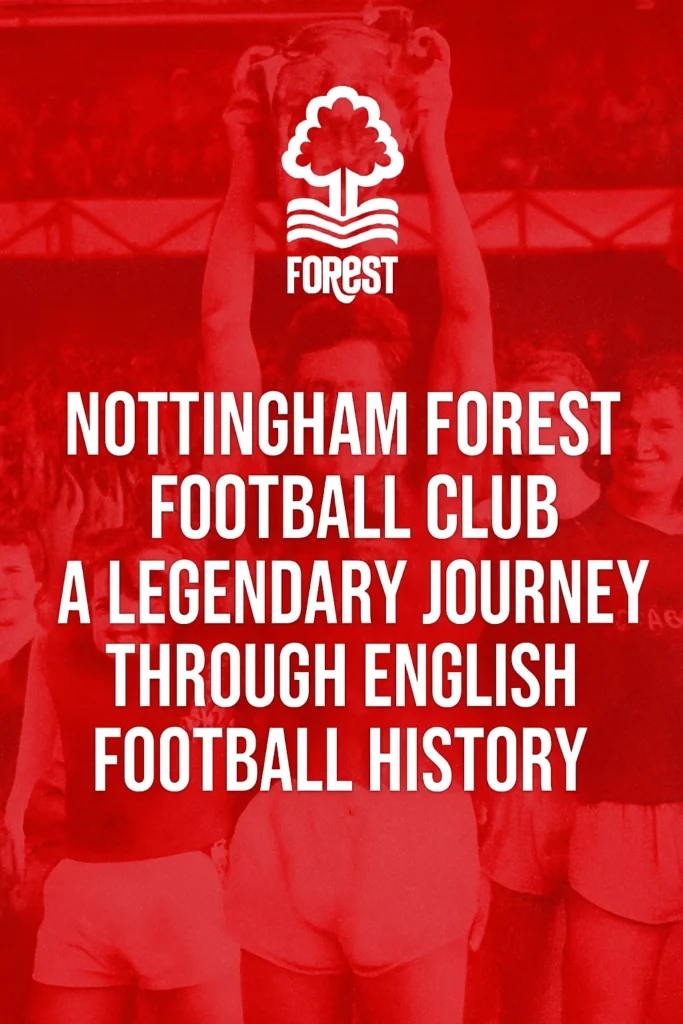Nottingham Forest Football Club History
Founded in 1865, Nottingham Forest Football Club began when a group of shinty players decided to form a football club. They chose Garibaldi red shirts in honor of the Italian freedom fighter, a color that still defines the club today. Their first match was played in 1866 against Notts County, marking the beginning of one of England’s oldest football rivalries.

Forest joined the Football League in 1892 and quickly made their mark by winning the FA Cup in 1898, defeating Derby County 3–1. This early success laid the foundation for a club that would go on to shape football history and even FIFA World Cup.
Post-War Struggles and Financial Instability
Like many English clubs, Nottingham Forest faced serious challenges after both World Wars. The First World War disrupted league football entirely, and Forest lost players to military service. After the Second World War, the club struggled to rebuild, both financially and competitively. The 1940s and 1950s were marked by inconsistent performances and limited resources, with Forest often hovering between divisions.
Financial problems resurfaced in the 1980s and 1990s, especially after the retirement of Brian Clough in 1993. Without his leadership, Forest faced relegation and mounting debts. The club’s drop into the lower tiers of English football led to reduced revenue, and ownership changes brought instability. By the early 2000s, Forest was in League One, the third tier, for the first time in its history. Despite efforts to restructure, financial constraints continued to limit progress until new investment arrived in the 2010s.
The Brian Clough Era: From Second Division to European Glory
No story about Nottingham Forest history is complete without Brian Clough. Appointed manager in 1975, Clough — alongside his trusted assistant Peter Taylor — transformed Forest from a mid-table Second Division side into European champions.
Key Achievements:
- 1977: Promoted to First Division
- 1978: Won the First Division title
- 1979 and 1980: Back-to-back European Cup wins
- Four League Cups and multiple domestic honors
Clough’s Forest played fearless, intelligent football. His leadership style, often eccentric but deeply effective, turned underdogs into legends. The club’s crest now proudly displays two stars, symbolizing those historic European triumphs.
Racism and Social Challenges
Like many clubs in England, Nottingham Forest has had to confront racism both on and off the pitch. During the 1970s and 1980s, Black players across the country faced abuse from crowds, and Forest was no exception. Players like Viv Anderson, who became the first Black footballer to play for England while at Forest, broke barriers but also endured discrimination.
In more recent years, Forest has actively supported anti-racism campaigns such as Kick It Out and shown solidarity with players taking a stand against racial abuse. The club has worked to promote inclusion and diversity, both in its squad and among its fanbase, reflecting broader efforts across English football to address racism.
Club Identity and Fan Culture
Forest’s home ground, The City Ground, sits beside the River Trent and has been the heart of the club since 1898. The fans — known for their loyalty and wit — have supported the team through highs and lows, from European nights to Championship battles.
The club’s identity is rooted in:
- Community pride
- Historic resilience
- A commitment to attacking football
Whether it’s the roar of the Trent End or the chants echoing through Nottingham, Forest fans carry the legacy forward with passion.
Relegation, Rebuilding, and Return to the Premier League
After Clough’s retirement, Forest faced turbulent years — including relegations, ownership disputes, and financial struggles. But the club never lost its spirit. Recent seasons have seen a revival, with Forest returning to the Premier League and investing in young talent, infrastructure, and global reach.
Modern Highlights:
- Promotion to Premier League in 2022
- Strategic signings and youth development
- Renewed ambitions for European qualification
Forest’s journey is a testament to resilience — proving that even after decades away from the top, history and heart can fuel a comeback.
Why Nottingham Forest History Still Inspires
- Legacy of leadership: Brian Clough’s impact is studied worldwide
- European pedigree: Few English clubs have won back-to-back European Cups
- Cultural relevance: Forest remains a symbol of football’s romantic era
- Fan loyalty: Generations of supporters keep the spirit alive
- Social progress: From Viv Anderson to modern anti-racism efforts, Forest continues to evolve
Final Thoughts
Nottingham Forest isn’t just a football club — it’s a story of transformation, triumph, and timeless identity. From humble beginnings to European glory, Forest’s history is a reminder that greatness can come from anywhere, and legends are built not just on trophies, but on belief.
